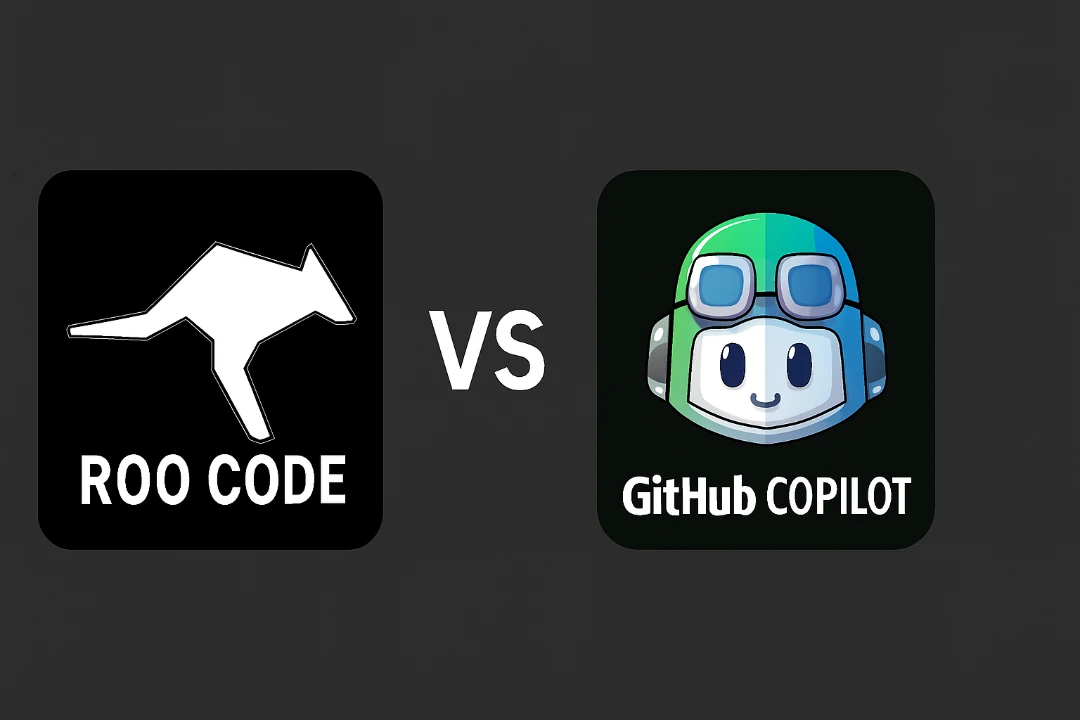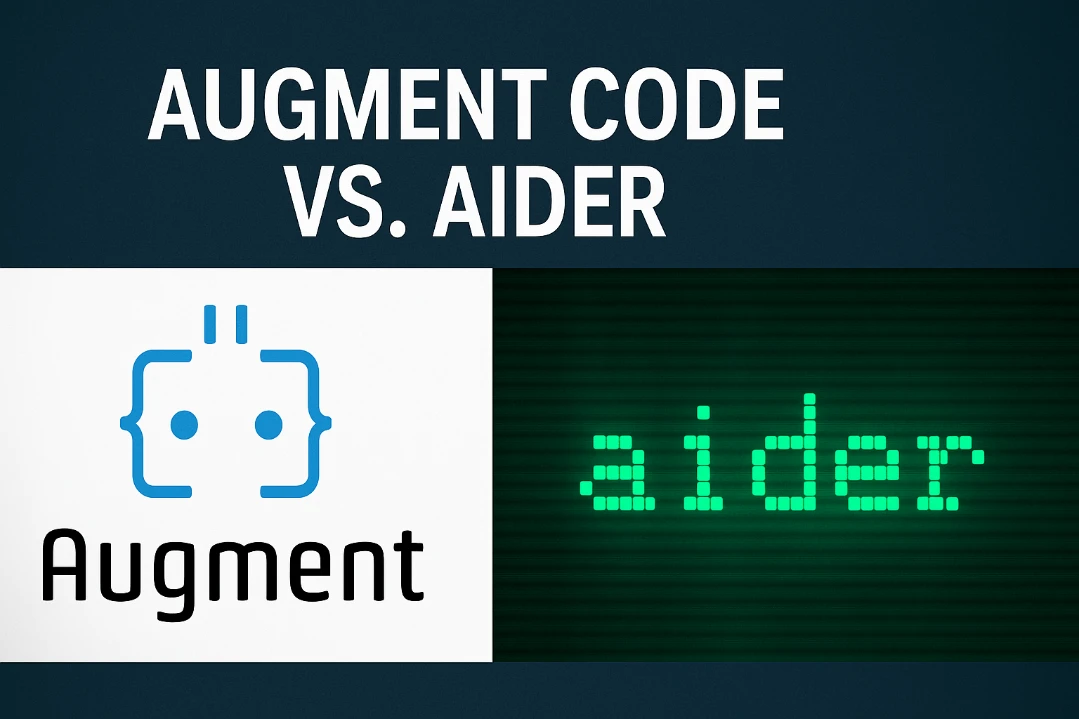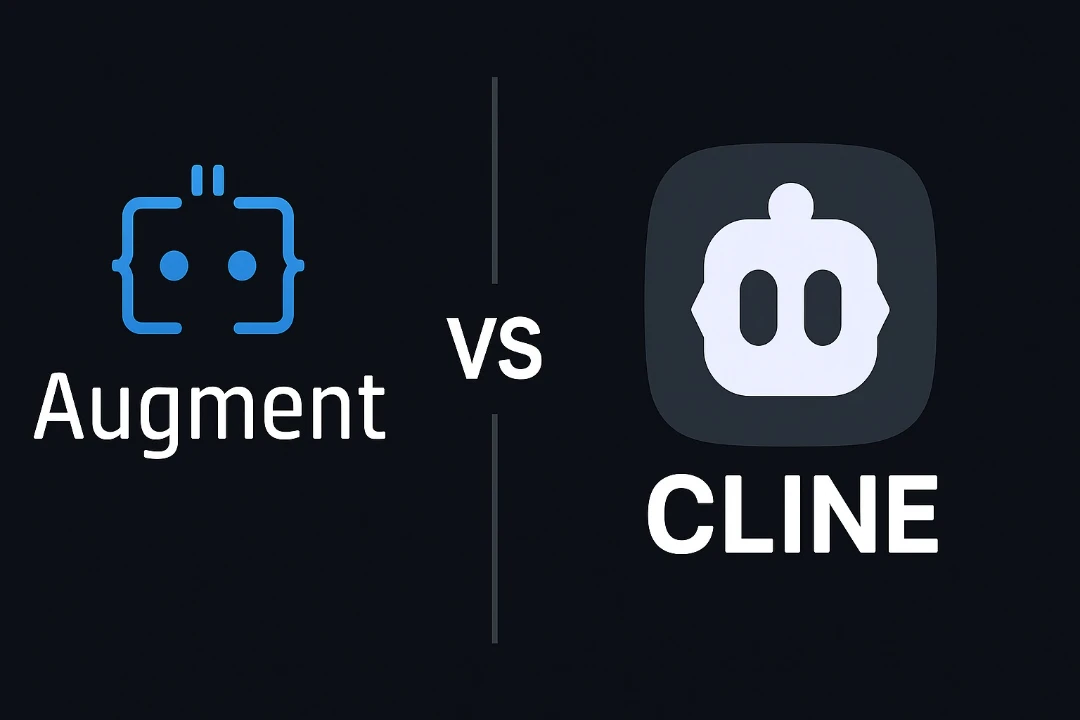
Roo Code vs GitHub Copilot: The Ultimate AI Coding Assistant Comparison in 2025
Roo Code vs GitHub Copilot: The Ultimate AI Coding Assistant Comparison in 2025
In the rapidly evolving landscape of software development, AI coding assistants have emerged as game-changing tools that can dramatically boost productivity and streamline workflows. Two leading contenders in this space—Roo Code and GitHub Copilot—offer sophisticated AI capabilities designed to transform how developers write, debug, and maintain code. While both tools leverage advanced language models to assist with coding tasks, they differ significantly in their approach, features, and ideal use cases.
This comprehensive guide examines the key differences between these powerful AI coding assistants, helping you determine which might better align with your development needs, workflow preferences, and technical requirements.
The Origin and Evolution of Roo Code and GitHub Copilot
Roo Code: The Highly Customizable VS Code Extension
Roo Code began as a fork of the popular Cline extension for VS Code, originally branded as "Roo Cline." Building on a solid foundation of autonomous coding capabilities, Roo Code has evolved into a highly customizable AI coding assistant that seamlessly integrates with your existing VS Code environment.
Open-source autonomous AI coding agent with extensive customization and multi-model support
As a VS Code extension rather than a standalone tool, Roo Code provides powerful AI assistance without requiring developers to migrate away from their familiar editor. Key capabilities include:
- Multiple specialized modes (Code, Architect, Ask, Debug)
- Creating and editing files with rich contextual awareness
- Executing terminal commands with user permission
- Browser automation for testing and debugging
- Deep codebase understanding and navigation
- Custom mode creation for specialized tasks
Recent updates have significantly improved Roo Code's performance, particularly in diff editing speed, which is now up to 10 times faster than previous versions. The extension continues to evolve with new features like customizable network timeouts and Quick Actions for faster code optimization.
GitHub Copilot: The OpenAI-Powered Industry Standard
GitHub Copilot, developed through a collaboration between GitHub and OpenAI, represents one of the most widely adopted AI coding assistants in the industry. Built on OpenAI's advanced language models and trained on billions of lines of code from public repositories, Copilot has established itself as a standard bearer for AI pair programming.
Microsoft and OpenAI's AI pair programmer with deep GitHub integration and multi-tier offerings
Integrated directly into popular IDEs like VS Code and available across the GitHub ecosystem, Copilot offers:
- Real-time code suggestions as you type
- Whole function generation from comments
- Natural language to code conversion
- Multiple interface options (completions, chat, workspace)
- Deep GitHub platform integration
- Code review capabilities
- Agent mode for autonomous task execution
GitHub Copilot has recently expanded its capabilities with features like code review and agent mode, which allows it to take on more complex development tasks with greater autonomy, bridging the gap between passive suggestion systems and active programming assistants.
Core Feature Comparison
When evaluating AI coding assistants, understanding their core capabilities is essential. Let's explore how Roo Code and GitHub Copilot compare across key functionality areas:
Code Generation and Editing
Roo Code:
- Multiple specialized modes tailored to different coding tasks
- Contextual code generation based on your codebase
- Efficient diff-based editing that modifies only necessary parts
- File creation and editing through natural language instructions
- Automatic detection and fixing of incomplete code segments
- Custom instructions for personalized code generation
GitHub Copilot:
- Real-time code completion as you type
- Whole function and class generation from comments
- Context-aware suggestions based on surrounding code
- Recently added code review capabilities
- Agent mode for autonomous coding tasks
- Workspace context for repository-wide awareness
Key Difference: Roo Code takes a more explicit, mode-based approach to AI-assisted coding with greater emphasis on customization and different "personas" for different tasks. GitHub Copilot provides a more streamlined experience that integrates directly into your coding flow with real-time suggestions and recently expanded autonomous capabilities through agent mode.
Terminal Command Execution
Roo Code:
- Execute commands in your existing VS Code terminal
- Real-time output processing and response
- Permission-based execution model for security
- Background task support for long-running processes
- Automated command execution for repetitive tasks
GitHub Copilot:
- Terminal support primarily through the Chat interface
- Command suggestions based on context
- Command explanation capabilities
- Limited automated execution compared to Roo Code
- Integration with GitHub Actions for workflow automation
Key Difference: Roo Code offers more comprehensive terminal integration with stronger automation capabilities, allowing the AI to execute, monitor, and respond to terminal operations more actively. GitHub Copilot's terminal support is more focused on suggesting and explaining commands rather than executing complex sequences autonomously.
Browser Automation
Roo Code:
- Built-in browser automation capabilities
- Launch local or remote web applications
- Execute automated tests
- Interact with web interfaces
- Screenshot capturing for documentation
- Quality adjustment for browser rendering
GitHub Copilot:
- No native browser automation
- Limited to code suggestions for testing frameworks
- Requires separate testing tools for browser automation
- Can generate browser automation scripts but not execute them
Key Difference: This represents one of the starkest differences between the two tools. Roo Code offers native browser automation that can launch browsers, interact with web elements, and capture visual feedback, while GitHub Copilot lacks this capability entirely, focusing instead on code-centric features.
Model Support and Flexibility
Roo Code:
- Support for a wide range of models via multiple providers
- OpenRouter, Anthropic, OpenAI, Google AI Studio integration
- Enhanced support for models like GPT-4o and Claude 3.7 Sonnet
- Compatible with local models through LM Studio/Ollama
- Custom model configuration and fine-tuning options
GitHub Copilot:
- Built on OpenAI's advanced models
- Recently updated to use GPT-4o for improved capabilities
- Limited model selection (tied to GitHub's offerings)
- Consistent performance across all users
- GitHub-optimized model training with code-specific enhancements
Key Difference: Roo Code follows a "bring your own API" approach that gives developers flexibility in choosing models and providers based on their needs and budget. GitHub Copilot offers a more curated experience with models specifically optimized for coding tasks but with less user choice in model selection.
Customization and Personalization
Roo Code:
- Custom modes for specialized tasks
- Customizable prompts and instructions
- Fine-grained control over tool permissions
- Project-specific configurations via .clinerules
- Auto-approval settings for workflow optimization
- Personalized AI behaviors for different contexts
GitHub Copilot:
- Workspace-level personalization
- Customizable workspace trust settings
- Limited prompt engineering capabilities
- Chat interfaces with some customization
- Personalization primarily through GitHub account context
- Repository-specific suggestions
Key Difference: Roo Code offers significantly more extensive customization options, allowing developers to create specialized AI assistants for different tasks with distinct behaviors and capabilities. GitHub Copilot provides a more standardized experience with personalization primarily centered around your existing GitHub context and repository.
User Experience Analysis
The user experience significantly impacts productivity and satisfaction with AI coding tools. Here's how Roo Code and GitHub Copilot compare:
Interface Design and Usability
Roo Code:
- Chat panel integrated into VS Code
- Mode-switching interface for different contexts
- Approval workflow for AI actions
- Visual feedback for code changes
- Explicit prompting for most operations
Roo Code's interface is designed around explicit interaction with the AI assistant through specialized modes, giving users clear control over the AI's behavior while maintaining the familiar VS Code environment.
GitHub Copilot:
- Multiple interaction models:
- Inline suggestions appear as you type
- Copilot Chat for conversational interaction
- Copilot Workspace for repository-wide assistance
- Ghost text suggestions that feel natural
- Sidebar integration for additional context
- Recently added agent mode for more autonomous operation
GitHub Copilot offers a more varied interface with multiple ways to interact with the AI, from passive inline suggestions to more explicit chat interfaces and the new agent mode. The inline suggestions create a more seamless coding experience that feels like an extension of your own thinking.
Learning Curve
Roo Code:
- Moderate learning curve for basic functionality
- Steeper curve for advanced features and customization
- Explicit mode switching requires some adaptation
- Configuration options can be overwhelming initially
- Strong documentation and community support
GitHub Copilot:
- Very low learning curve for basic code suggestions
- Inline suggestions work immediately with minimal setup
- Chat interface follows familiar conversational patterns
- New agent mode has a steeper learning curve
- Extensive official documentation and large user community
GitHub Copilot generally offers a gentler onboarding experience, particularly for its core inline suggestion functionality, which works "out of the box" with minimal configuration. Roo Code requires more initial setup and understanding of its mode-based approach but offers greater depth of customization for those willing to invest the time.
A mid-level developer who used both tools commented: "Copilot felt instantly useful from the first minute, while Roo Code took some configuration to get right. But after a week, I found myself using Roo Code's specialized modes for different tasks, which ultimately gave me more flexibility."
Cost and Pricing Comparison
Understanding the cost structure of AI coding assistants is crucial for making an informed decision, especially for long-term use.
Pricing Models
Roo Code:
- Free extension with BYOM (Bring Your Own Model) approach
- Costs based on API usage of chosen models
- Compatible with OpenRouter for centralized API billing
- No subscription fee for the extension itself
- Flexible model choice allows cost optimization
GitHub Copilot:
- $10/month subscription for individual developers
- $19/month for businesses with corporate features
- Free for verified students, teachers, and maintainers of popular open source projects
- Enterprise pricing available for larger organizations
- All features included in subscription
Key Difference: Roo Code operates on a "pay for what you use" model through external API services, giving users complete control over their AI expenditure but requiring management of API keys and possibly multiple accounts. GitHub Copilot follows a straightforward subscription model with predictable monthly costs and no need to manage separate API accounts or tokens.
Cost Management Strategies
Roo Code:
- Use of OpenRouter for discounted API rates
- Model switching for cost-appropriate tasks
- Context window customization to reduce token usage
- Settings optimization for efficiency
- Local model support for zero-API-cost operation
GitHub Copilot:
- Fixed monthly cost regardless of usage
- No need to monitor token consumption
- Unlimited usage within subscription
- Free tier for qualifying students and open source maintainers
- Enterprise volume discounts available
Cost Consideration: For occasional users or those working with smaller codebases, Roo Code might offer cost advantages through its pay-for-what-you-use model, especially when leveraging local models or cheaper API options. For regular, heavy users, GitHub Copilot's fixed subscription price provides predictable costs without the need to monitor usage.
A freelance developer noted: "I used to worry about AI costs with Roo Code until I set up local models for routine tasks. Now I save my API budget for complex problems where I need the most powerful models, and my monthly costs are lower than a Copilot subscription."
Real-World Applications and Use Cases
Each tool excels in different scenarios based on their design philosophy and capabilities.
Ideal Use Cases for Roo Code
1. Teams Requiring Deep Customization Development teams that need specialized AI behaviors for different tasks will benefit from Roo Code's custom modes. Security teams can create security audit modes, documentation teams can build specialized documentation modes, and architects can use architecture modes—all with tailored prompts and permissions.
2. Multi-Model Development Environments Organizations that want to leverage different AI models for different tasks will appreciate Roo Code's flexible model support. This allows teams to use cost-effective models for routine tasks while reserving powerful models for complex problems.
3. Projects Requiring Browser Automation Web development teams that need integrated testing and browser interaction can leverage Roo Code's browser automation to create, test, and debug web applications without switching contexts.
4. Developers Who Value Control Developers who prefer explicit control over AI operations and want to approve actions before they happen will find Roo Code's permission-based workflow reassuring, especially when working with sensitive codebases.
Ideal Use Cases for GitHub Copilot
1. GitHub-Centric Teams Teams already deeply integrated with GitHub for source control, issues, and project management will benefit from Copilot's seamless integration with the broader GitHub ecosystem, including features like code review that tie directly into pull requests.
2. Developers Seeking Seamless Assistance Developers who prefer a more ambient AI experience that offers suggestions as they type rather than requiring explicit prompting will find GitHub Copilot's inline suggestion model more intuitive and less disruptive to their flow.
3. Large Organizations with Compliance Requirements GitHub Copilot for Business offers features designed for enterprise compliance, including IP indemnity, public code filtering, and policy controls that make it suitable for organizations with strict governance requirements.
4. Open Source Maintainers and Students Qualifying open source maintainers and students can access GitHub Copilot for free, making it an attractive option for educational environments and open source projects with limited budgets.
User Testimonials and Community Feedback
Real users provide valuable insights into how these tools perform in practice. Here's what developers are saying:
Roo Code User Feedback
"Roo Code's multi-mode capability has transformed how I approach development. I switch to Architect mode when planning system structure, then Code mode for implementation, and it feels like having a specialized expert for each phase." - Senior Backend Developer
"The customization options in Roo Code are unmatched. I've created specialized modes for security auditing, documentation, and even onboarding new team members. Each one has tailored prompts and tool permissions." - DevOps Engineer
"Being able to use my preferred models through my own API keys gives me complete control over costs and quality. Some days I use GPT-4o for complex tasks, other days I switch to cheaper or local models for routine work." - Freelance Developer
"The browser automation feature saved our QA process. We can now test UI flows directly from the development environment without switching to separate testing tools." - Frontend Lead
GitHub Copilot User Feedback
"Copilot's inline suggestions are almost magical—they appear exactly when I need them and are surprisingly accurate. It's like the tool can read my mind." - Full-Stack Developer
"The new code review feature has transformed our pull request process. It catches issues I would have missed and explains its reasoning clearly." - Software Engineer
"Copilot Chat has become my go-to for explaining complex code. I can highlight a confusing section and ask 'What's happening here?' and get a clear, contextual explanation instantly." - Junior Developer
"Agent mode is a game-changer for routine tasks. I can describe what I need in plain English, and it handles the implementation details while I focus on higher-level problems." - Technical Lead
Performance and Efficiency
How these tools perform in real-world coding scenarios can significantly impact your productivity.
Speed and Responsiveness
Roo Code:
- Recent 10x performance improvement in diff editing
- Response time depends on chosen API provider
- Customizable network timeouts for different environments
- Performance varies with model selection
- Local model option for reduced latency
GitHub Copilot:
- Extremely fast inline suggestions with minimal latency
- Optimized for real-time responsiveness
- Consistent performance across different coding contexts
- Chat responses typically quick but vary with query complexity
- Agent mode operations take longer but handle complex tasks
Performance Comparison: GitHub Copilot generally offers superior responsiveness for its core inline suggestions, which appear almost instantly as you type. Roo Code's performance depends more heavily on your chosen model and API provider, though its recent optimizations have significantly improved responsiveness, particularly for diff-based editing.
Code Quality and Accuracy
Roo Code:
- Quality varies with selected model
- Mode-specific optimization for different tasks
- Diff-based editing provides clear quality control
- Manual approval workflow ensures oversight
- Contextual awareness through file reading capabilities
GitHub Copilot:
- Highly accurate suggestions for common patterns
- Trained on vast repositories of high-quality code
- Code review capabilities help catch potential issues
- Deep understanding of GitHub repositories
- Quality improves with repository context
Quality Comparison: Both tools can generate high-quality code, but GitHub Copilot's training on billions of lines of code from GitHub repositories gives it an edge for common coding patterns and standard libraries. Roo Code's quality depends more on the selected model but offers more explicit quality control through its approval workflow.
Integration with Development Ecosystem
How well these tools fit into your broader development environment is crucial for seamless adoption.
IDE and Platform Support
Roo Code:
- Primary support for VS Code
- Compatible with VS Codium and similar forks
- Potential future support for other editors
- Limited platform integrations beyond VS Code
- Focused on editor experience rather than platform features
GitHub Copilot:
- Support for multiple environments:
- VS Code
- Visual Studio
- JetBrains IDEs
- Neovim
- GitHub.com
- GitHub Codespaces
- Deep integration with GitHub platform
- Consistent experience across environments
- Terminal-based support in Windows Terminal
Integration Difference: GitHub Copilot offers significantly broader platform support across multiple IDEs and the GitHub ecosystem, creating a more consistent experience regardless of your development environment. Roo Code is primarily focused on enhancing the VS Code experience, with limited support for other platforms.
Workflow Compatibility
Roo Code:
- Fits into existing VS Code workflows
- Augments rather than replaces current practices
- Adaptable to team-specific processes
- Support for MCP protocol for extended capabilities
- Integration with external tools through API connections
GitHub Copilot:
- Seamless integration with GitHub-centered workflows
- Native support for pull requests and code reviews
- Works alongside GitHub Actions for CI/CD
- Integrates with code navigation and exploration
- Agent mode supports complex workflow automation
Workflow Comparison: GitHub Copilot offers stronger integration with GitHub-centered development workflows, particularly for teams that rely heavily on GitHub for collaboration, code review, and project management. Roo Code provides a more editor-centric experience with greater flexibility for teams using diverse tools beyond the GitHub ecosystem.
Future Development and Community Support
The long-term viability and growth of these tools depend on their development trajectory and community engagement.
Development Velocity
Roo Code:
- Regular updates with performance improvements
- Community-driven feature development
- Open source with contributor ecosystem
- Responsive to user feedback
- Agile development with frequent iterative improvements
GitHub Copilot:
- Backed by GitHub and OpenAI resources
- Strategic product roadmap
- Regular feature expansions (Chat, Workspace, Agent Mode, etc.)
- Enterprise-focused security and compliance enhancements
- Model improvements tied to OpenAI's advancements
Development Comparison: GitHub Copilot benefits from the significant resources of GitHub and OpenAI, enabling more consistent development and strategic feature rollouts. Roo Code follows a more community-driven development model that can be more responsive to user requests but may be less predictable in its development trajectory.
Community and Support
Roo Code:
- Active Discord and Reddit communities
- Open source with direct developer engagement
- Community-driven documentation and tutorials
- GitHub issues for support and feature requests
- Collaborative problem-solving approach
GitHub Copilot:
- Extensive official documentation
- GitHub Community discussions
- Enterprise support options
- Large user base sharing knowledge
- Regular webinars and learning resources
Community Comparison: Both tools have active communities, but their nature differs significantly. Roo Code's community is more grassroots and collaborative, centered around open source contribution and direct engagement with developers. GitHub Copilot offers more structured support resources and benefits from GitHub's established developer community.
Conclusion: Choosing the Right Tool for Your Needs
After thoroughly examining Roo Code and GitHub Copilot, it's clear that both offer powerful AI-assisted coding capabilities but with distinct approaches and strengths. Your choice should align with your development style, preferences, and specific needs.
Choose Roo Code if:
- You value extensive customization and want to create specialized AI modes for different tasks
- You prefer flexibility in choosing AI models and providers based on cost and performance
- You need integrated browser automation capabilities for web development
- You want explicit control over AI actions through an approval-based workflow
- You're comfortable managing API keys and potentially multiple service providers
- You prefer open source tools with community-driven development
Choose GitHub Copilot if:
- You want a seamless, low-setup experience with inline suggestions that appear as you type
- Your workflow is centered around GitHub and its ecosystem
- You prefer a simple subscription model with predictable costs
- You work across multiple IDEs and want a consistent experience
- You need enterprise features like compliance controls and policy management
- You value the stability and resources of tools backed by major companies
The Hybrid Approach
Many developers find value in using both tools for different scenarios. GitHub Copilot might be preferred for rapid coding with inline suggestions, while Roo Code could be the tool of choice for specialized tasks requiring customization or browser automation. Consider how each might fit into different aspects of your development workflow rather than viewing them as mutually exclusive options.
Ultimately, the best AI coding assistant is the one that seamlessly integrates into your workflow and enhances your productivity without introducing friction. Both Roo Code and GitHub Copilot represent the cutting edge of AI-assisted development, and your specific needs will determine which is the perfect fit for your coding journey.
Further Resources
To explore these tools further:


